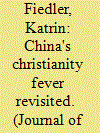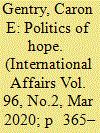|
|
|
Sort Order |
|
|
|
Items / Page
|
|
|
|
|
|
|
| Srl | Item |
| 1 |
ID:
102448


|
|
|
|
|
| Publication |
2010.
|
| Summary/Abstract |
Chinese Protestant Christianity has been continually growing over the past three decades, with an estimated one million converts per year. A number of studies have sought to explain this phenomenon. This paper critically reviews existing studies of China's "Christianity Fever" and then outlines the role of the community as one crucial factor in the conversion process. With its emphasis on communality, as a central element of both Christian theology and the fellowship activities that are part of Christian practice, Protestant Christianity fills a gap opened up by the change in traditional familial and social structures. By discussing specific aspects relating to the communal nature of Christianity, such as familism, elitism, and dynamics at work in face-to-face evangelism, this paper offers an alternative reading of existing studies.
|
|
|
|
|
|
|
|
|
|
|
|
|
|
|
|
| 2 |
ID:
171194


|
|
|
|
|
| Summary/Abstract |
Situated within feminist Christian Realism, this article looks at what political theology is and its relevance to International Relations. Hope is a central theme to political theology, underpinning the necessity to be witness to and to work against oppressive structures. Simply put, hope is the desire to make life better. For Christians, this hope stems from a belief in resurrection of Christ and the faith that such redemption is offered to all of humanity. Hope, however, is not limited to Christianity and, therefore, Christian theology. Thus, taking an intersectional approach, the article looks for similarities in how hope is articulated in three personal narratives: theologian Jürgen Moltmann, UK Muslim advocate Asim Qureshi, and Black Lives Matter co-founder Patrisse Khan-Cullors. Across all three personal narratives, the need for hope begins in a place of despair, signalling a need to recognize that hope and privilege are in tension with one another. Feminist Christian Realism acknowledges and embraces this tension, recognizing that hope cannot function if the pain, oppression and harm caused by privilege are erased or minimized.
|
|
|
|
|
|
|
|
|
|
|
|
|
|
|
|
|
|
|
|
|